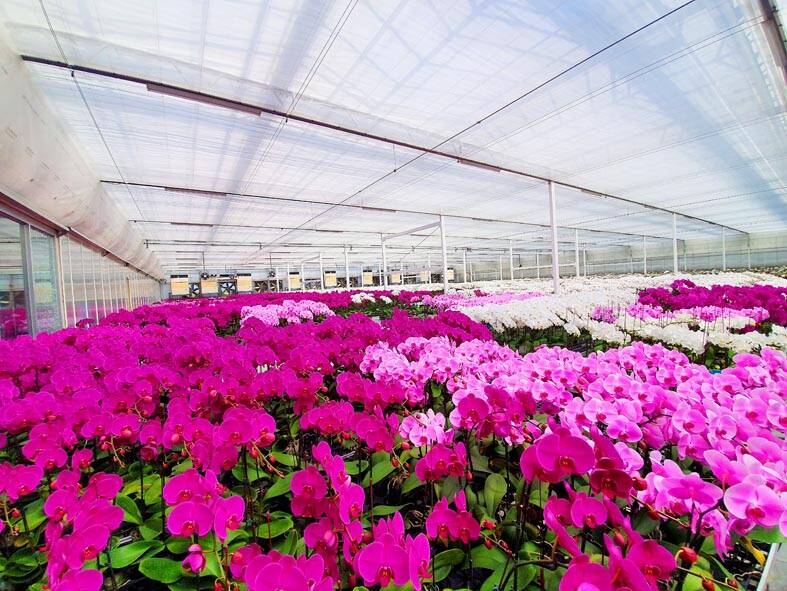Taiwan’s phalaenopsis orchids, or moth orchids, plastics and machine tool exports are to face heightened competition, as the US began imposing a 20 percent “temporary” tariff on Taiwan yesterday, the Executive Yuan said, adding that some industry players expect a “limited” impact.
While the levy is lower than the previous 32 percent proposal, industries are likely to experience uneven impacts, Executive Yuan Secretary-General Kung Ming-hsin (龔明鑫) said.
Moth orchids are a concern, as Taiwan has a 46 percent share of the US market, Kung said.

Photo: Wang Han-ping, Taipei Times
Taiwan’s main competitor, the Netherlands, has a 40 percent share and faces a lower 15 percent tariff.
Companies have been contending with a 10 percent tariff since April, and the jump to 20 percent would create new pressure, he said.
To address the situation, the Executive Yuan is drafting a special budget and would provide immediate short-term assistance, he said.
Deputy Trade Representative Yen Huai-shing (顏慧欣) said Taiwan saw the second-largest tariff reduction among countries that have a trade deficit with the US.
The levy is “temporary,” Yen said, adding that Taipei is still in negotiations with Washington.
Yen cited a notice the negotiating team received before Thursday last week as saying that the “Taiwan-US meeting had not been completed.”
Only the EU secured a more favorable rate than Taiwan at 15 percent rate, she said, adding that although Japan and South Korea also received 15 percent levies, they have smaller trade deficits with the US.
Formosa Plastics Group on Wednesday said that the new US tariff would have a limited impact, as the company’s export volume to the US is relatively low.
However, indirect effects could be significant, it said, warning that high tariffs might drive inflation and weaken US consumer spending.
Formosa Chemicals and Fibre Corp chairman Hong Fu-yuan (洪福源) previously said that the company exported NT$5.1 billion (US$171.03 million) of goods to the US last year — about 2 percent of its total annual revenue of NT$243.8 billion.
More than half of those exports could avoid tariffs, while the rest would be withdrawn from the US market, he said.
Machine tool company Fair Friend Group (FFG) former chairman Yang Te-hua (楊德華) on Wednesday said that the company had already raised low-cost inventory levels at its US warehouses to offset the short-term impact.
Only 10 percent of FFG’s exports go to the US, so the overall effect on the group would be limited, he added.

The manufacture of the remaining 28 M1A2T Abrams tanks Taiwan purchased from the US has recently been completed, and they are expected to be delivered within the next one to two months, a source said yesterday. The Ministry of National Defense is arranging cargo ships to transport the tanks to Taiwan as soon as possible, said the source, who is familiar with the matter. The estimated arrival time ranges from late this month to early next month, the source said. The 28 Abrams tanks make up the third and final batch of a total of 108 tanks, valued at about NT$40.5 billion

Two Taiwanese prosecutors were questioned by Chinese security personnel at their hotel during a trip to China’s Henan Province this month, the Mainland Affairs Council (MAC) said yesterday. The officers had personal information on the prosecutors, including “when they were assigned to their posts, their work locations and job titles,” MAC Deputy Minister and spokesman Liang Wen-chieh (梁文傑) said. On top of asking about their agencies and positions, the officers also questioned the prosecutors about the Cross-Strait Joint Crime-Fighting and Judicial Mutual Assistance Agreement, a pact that serves as the framework for Taiwan-China cooperation on combating crime and providing judicial assistance, Liang

A group from the Taiwanese Designers in Australia association yesterday represented Taiwan at the Midsumma Pride March in Melbourne. The march, held in the St. Kilda suburb, is the city’s largest LGBTQIA+ parade and the flagship event of the annual Midsumma Festival. It attracted more than 45,000 spectators who supported the 400 groups and 10,000 marchers that participated this year, the association said. Taiwanese Designers said they organized a team to march for Taiwan this year, joining politicians, government agencies, professionals and community organizations in showing support for LGBTQIA+ people and diverse communities. As the first country in Asia to legalize same-sex

MOTIVES QUESTIONED The PLA considers Xi’s policies toward Taiwan to be driven by personal considerations rather than military assessment, the Epoch Times reports Chinese President Xi Jinping’s (習近平) latest purge of the Chinese People’s Liberation Army (PLA) leadership might have been prompted by the military’s opposition to plans of invading Taiwan, the Epoch Times said. The Chinese military opposes waging war against Taiwan by a large consensus, putting it at odds with Xi’s vision, the Falun Gong-affiliated daily said in a report on Thursday, citing anonymous sources with insight into the PLA’s inner workings. The opposition is not the opinion of a few generals, but a widely shared view among the PLA cadre, the Epoch Times cited them as saying. “Chinese forces know full well that